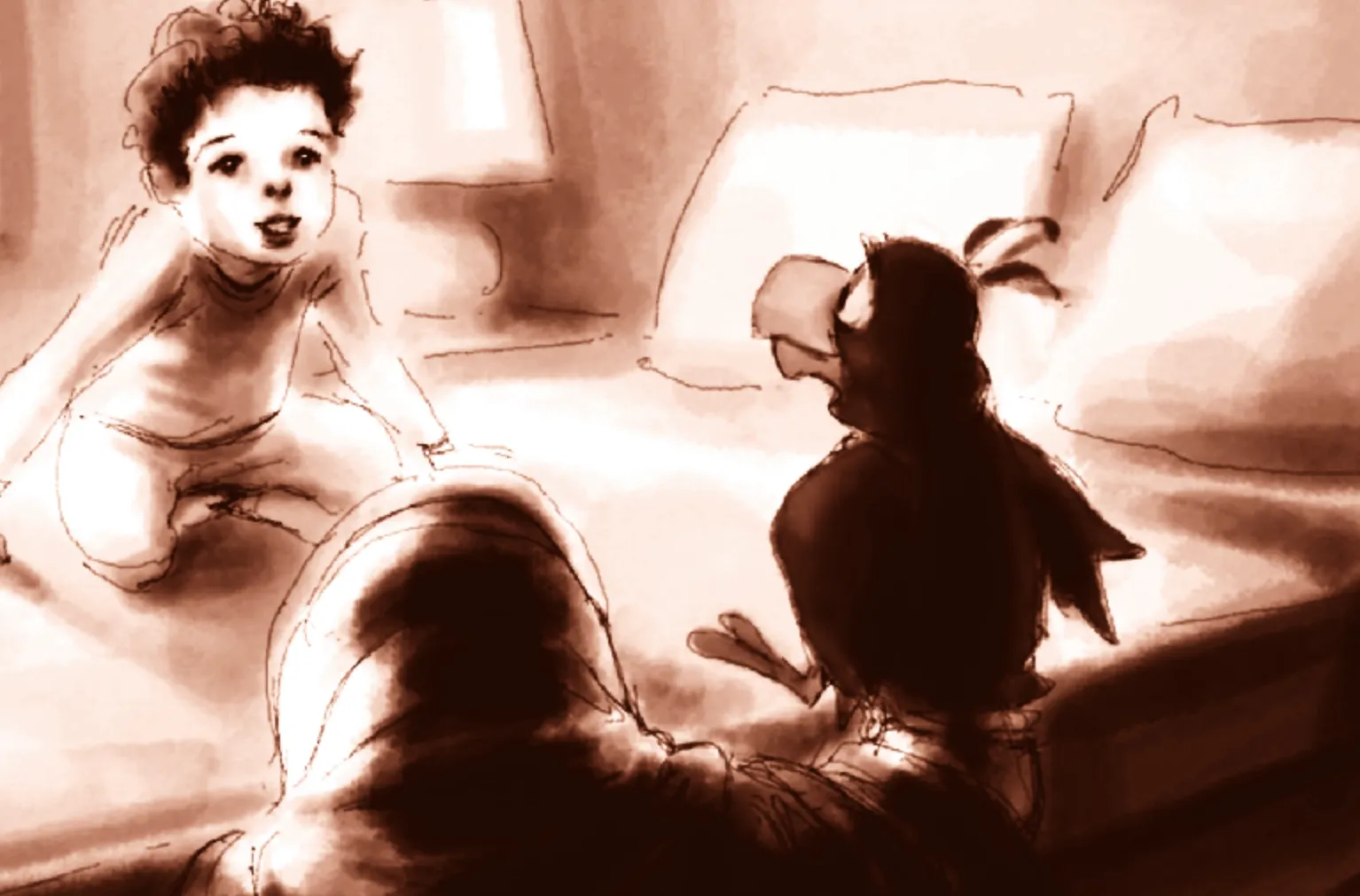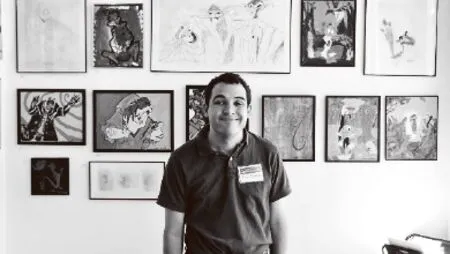动画片,让消失的男孩回归
2017-06-01ByDavidEdelstein
⊙ By David Edelstein
翻译:蒺藜
动画片,让消失的男孩回归

⊙ By David Edelstein
翻译:蒺藜


对于很多人来说,动画片是用来娱乐消遣的,但是对于本文的主人公欧文来说,迪士尼动画片却是引领他重回这个世界的灯塔。催泪记录片《生活,动画》(Life, Animated)根据欧文父亲罗恩·萨斯坎德(普利策新闻奖得主)写的小说《消失的男孩》拍摄而成。导演罗杰·罗斯·威廉姆斯说:“我想要述说主角欧文的动人故事,同时开创一个深入探讨自闭症的空间。欧文是个特别的孩子,对人生的观察极为独特,因为他完全不受社会化的影响与阻挠。他活在自己的童话寓言里,寻找自己的方式来理解这个世界,也因此对人生有许多丰富且睿智的体会。”
Owen Suskind, who has autism,2)figures out how to navigate the world using Disney cartoons as a reference point. When Owen (Ron Suskind and his wife Cornelia’s second son) was born, he seemed “normal” until age three when, as Suskind puts it, “he vanished.” His3)motor skills4)deteriorated. He lost what language he’d attained. “Autism was5)diagnosed,” says Suskind. “Someone6)kidnapped our son.”
One day, he came to his parents saying words they could barely understand, which turned out to be “just your voice.” It’s a phrase from The Little Mermaid, whose7)heroine is told she’ll have to8)surrender something. “Just your voice.” Over and over, he says those words. And a doctor tells the Suskinds it might be9)echolalia—that is, mere repetition. “Or it might
be,” says Suskind, “a sign that he’s still in there.”
Ron Suskind (Owen’s Father): So I go up to his room. I see Owen on the bed10)flipping through a Disney book. And I see…sort of over to my left, I see Iago the11)puppet. I grab the puppet. I pull it up to my elbow. And I begin to12)crawl across the rug as quietly as I can. And Owen turns to the puppet like he’s13)bumping into an old friend. (Imitating Iago’s voice) I say to him, “Owen, Owen. How does it feel to be you?”
Owen: And I said, “Not good ’cause I don’t have any friends.”
Ron: Now I’m under the14)bedspread, and I just bite down hard, you know? (Imitating Iago’s voice) And I said, “OK, OK. Owen, when did you and I become such good friends?”
And he said, “When I watched Aladdin, youmade me laugh.”
And then we talk—Owen and Iago—for a minute…minute and a half! It’s the first conversation we’ve ever had!
There’s no way of knowing if or when Owen would have found his voice without Disney, no way of exploring that road not taken. But as I watched Owen pace, hands behind his back, showing anxiety and self-15)consciousness as he tried to learn social16)cues, I thought, maybe it helps that he can identify with a character in a movie. Maybe this is how someone with autism can learn17)empathy.
Today, Owen is 23, and in the process of graduating from a special school in Cape Cod. He’ll be moving into his own apartment in an assisted-living18)facility. He has a girlfriend. He’s still watching Disney cartoons. He even runs a Disney cartoon club, which, he says, makes him popular with other students.
1) autism [΄ɔːtIz(ə)m] n. 孤独症,自闭症
2) figure out 弄明白
3) motor skill 运动技能,指人有效地完成动作的一种能力,包括大脑皮质调节下不同肌肉群间的协调性,即在空间内正确运用肌肉工作的能力,这里指穿衣、使用筷子或刀叉等基本生活技能。
4) deteriorate [dI΄tIərIəreIt] v. 使恶化,变糟
5) diagnose [daIəɡ΄nəʊz] v. 诊断
6) kidnap [΄kIdnæp] v. 绑架,拐带
7) heroine [΄herəʊIn] n. 女主人公,女主角
8) surrender [sə΄rendə(r)] v. 投降,放弃
9) echolalia [΄ekəʊ΄leIlIə] n. 模仿言语症,尤指精神不正常的一种症候。
10) flip through 匆匆翻看
11) puppet [΄pʌpIt] n. 木偶,布偶
12) crawl [krɔːl] v. 爬,爬行
13) bump into 偶然碰见
14) bedspread [΄bedspred] n. 床罩
15) consciousness [΄kɒnʃəsnIs] n. 意识,知觉,感觉
16) cue [kjuː] n. 提示,暗示
17) empathy [΄empəθI] n. 感情移入,同感
18) facility [fə΄sIlItI] n. 设施,设备


欧文·萨斯坎德是一名自闭症患者,他借助迪士尼动画片摸索出游历这个世界的方式。当欧文(萨斯坎德和他妻子科妮莉亚的第二个儿子)诞生时,他看上去“很正常”——直到他三岁那年,用萨斯坎德的话来说就是“他突然消失了”。他的运动技能衰退了。他失去了此前已习得的语言能力。“他被诊断出患有自闭症,”萨斯坎德说道,“就像有人把我的儿子给掳走了。”
有一天,欧文来到父母跟前,说着一些他们好不容易才听懂的话,原来他说的是“只要你的声音”。这是一句来自动画片《小美人鱼》的台词,片中女主角被告知她必须牺牲某样东西。“只要你的声音”——一遍又一遍,他念叨着这句话。有位医生告诉萨斯坎德夫妇,这可能只是模仿言语症——换言之,纯粹重复模仿而已。“也可能是表明他的灵魂还在那里,” 萨斯坎德说。
罗恩·萨斯坎德(欧文的父亲):于是我上到他的房间。我看到欧文在床上翻看一本迪士尼的书。然后我看到……差不多就在我左边,我看到一个鹦鹉艾格的布偶。我抓起布偶,把它套在手上。然后我尽可能安静地在地毯上匍匐前进。接着欧文转过身来,好像无意中遇到了老朋友似的。(模仿艾格的声音)我对他说:“欧文,欧文。你感觉怎么样呀?”
欧文:然后我说:“不太好,因为我没有朋友。”
罗恩:你知道吗,当时我正趴在床罩下面,咬紧牙关趴在那儿。(模仿艾格的声音)接着我说:“好的,好的。欧文,我们是什么时候成了好朋友的?”
然后他说:“在我看《阿拉丁》的时候,你逗我笑了。”
我们继续聊着——欧文和艾格——聊了足足有一分钟……一分半钟!这可是我们之间的第一次对话!
没人知道如果没有迪士尼动画片,欧文能否——或者要到什么时候才可以找回他自己的声音,没有发生的事无法知晓。但当我看到欧文背着手踱步,看到他在学习如何获得社交信息时所表现出的焦虑和自我意识,我想,或许他对动画片里的角色有认同感这事对他会有帮助。或许这是自闭症患者学习同感能力的一种方式。
如今,欧文已经23岁了,正准备从美国科德角半岛的一所特殊教育学校毕业。他将会搬入配有辅助生活设施的、属于他自己的公寓生活。他有一位女朋友,他还在看迪士尼动画片。他甚至在打理一个迪士尼动画俱乐部,他说,因为这会让他受到其他同学的欢迎。
◆ assisted-living facility 辅助生活机构:辅助生活机构源于北欧的养老模式,20世纪90年代起在欧美逐渐流行。它是在适宜环境中向生活需要帮助的老人和残疾人群长期提供必要性服务的综合体。辅助生活服务包括:24小时保护性监控、食物、住房,以及组织与配合提高个人生活质量的各种服务。辅助生活机构并不能取代护理院,却是护理院的补充。它在一个争取最大限度满足个人独立、隐私和选择的环境中把住所、生活服务和简单的医疗护理结合起来。
